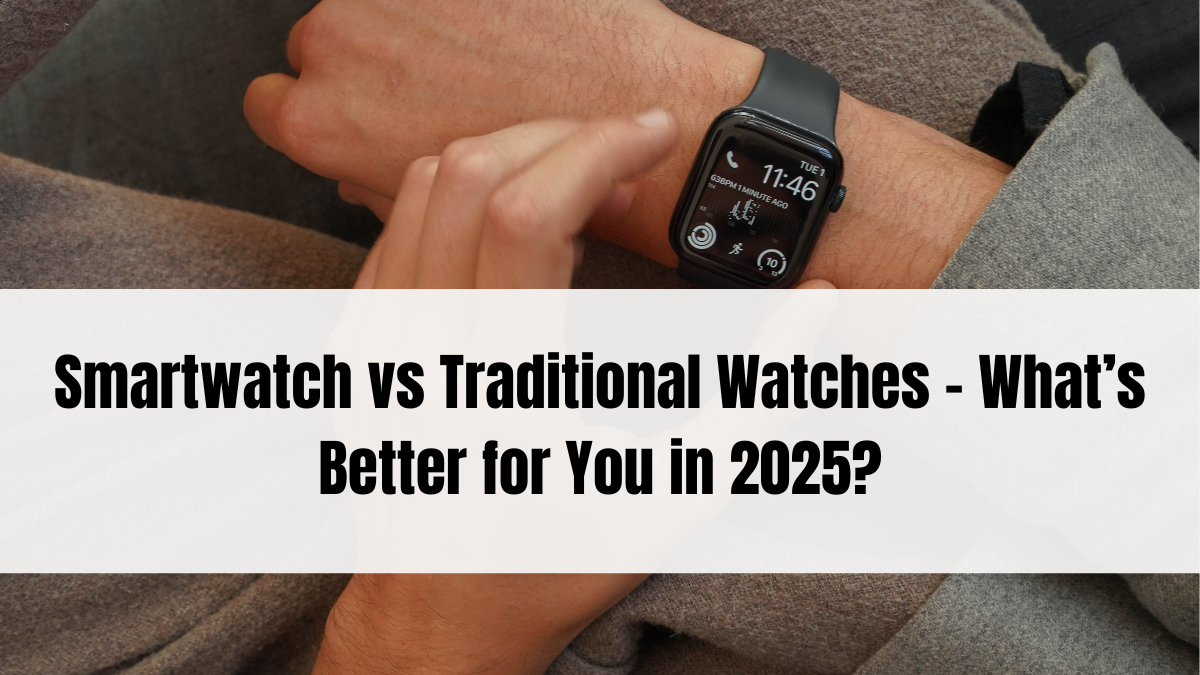Wristwatches are no longer just timekeepers. In 2025, the debate between Smartwatch vs Traditional watches is stronger than ever, with consumers split between digital convenience and timeless elegance. With major brands enhancing both types, the choice depends on your lifestyle, needs, and fashion sense.
Whether you’re tracking your heartbeat on a morning run or admiring the craftsmanship of a mechanical watch, both categories bring something unique to the table. Here’s a closer look at the features, benefits, and differences that set them apart in today’s market.

What is a Smartwatch?
A smartwatch is a wearable device that pairs with your smartphone to deliver notifications, track fitness, and run apps. Modern smartwatches go beyond steps and heart rate—they include features like:
-
Calling and messaging
-
GPS tracking
-
Health and sleep monitoring
-
Voice assistants (like Alexa or Google)
-
App ecosystem for productivity and entertainment
What is a Traditional Watch?
Traditional watches include analog (mechanical or quartz) and digital timepieces without smart connectivity. They are known for:
-
Long battery life (months or years)
-
Durable build
-
No distractions or notifications
-
Fashion-forward designs, often with heritage appeal
They offer simplicity and elegance that tech-driven gadgets may lack.
Side-by-Side Comparison
| Feature | Smartwatch | Traditional Watch |
|---|---|---|
| Battery Life | 1–7 days | Months to years |
| Fitness Tracking | Yes (steps, sleep, heart rate, etc.) | No |
| Notifications | Yes (calls, messages, emails) | No |
| Style & Variety | Modern, tech-focused | Classic, luxury, minimal, sporty |
| App Support | Yes (third-party apps) | None |
| Price Range | ₹2,000 – ₹50,000+ | ₹1,000 – ₹1,00,000+ |
| Maintenance | Needs frequent charging | Minimal (battery or automatic) |
| Lifespan | 2–5 years average | 10+ years if maintained well |
Advantages of Smartwatches
-
Instant access to messages and calls on the wrist
-
Fitness and health tracking for active users
-
Customizable watch faces and straps
-
Voice assistant access (Google, Siri, etc.)
-
Emergency features like fall detection and SOS alerts
Smartwatches are ideal for tech-savvy professionals, students, fitness lovers, and those who prefer an all-in-one gadget.
Advantages of Traditional Watches
-
No distractions or screen time
-
Excellent as formal wear and luxury fashion
-
Resale value for premium models
-
No regular charging required
-
Symbol of status and timeless craftsmanship
Perfect for businessmen, watch collectors, and people who value aesthetics and simplicity over tech.
Choosing the Right Watch for You
Pick a smartwatch if you:
-
Want to stay connected without checking your phone
-
Are into fitness or health tracking
-
Prefer digital features like voice commands, GPS, and apps
Pick a traditional watch if you:
-
Prefer minimalism and classic fashion
-
Want a long-lasting, low-maintenance timepiece
-
See your watch as an accessory or heirloom item
Top Brands in Each Category
Popular Smartwatch Brands in India (2025):
-
Apple
-
Samsung
-
Noise
-
Fire-Boltt
-
Garmin
-
Amazfit
Popular Traditional Watch Brands:
-
Titan
-
Casio
-
Seiko
-
Tissot
-
Fossil
-
Timex
FAQs
Is a smartwatch better than a traditional watch?
It depends on your needs. Smartwatches are feature-rich, while traditional watches offer durability and style.
Do smartwatches work without a phone?
Most smartwatches require a smartphone for full functionality, though some have LTE support for independence.
Can traditional watches be worn with formal wear?
Yes, traditional watches are considered ideal for formal events and business attire.
Are smartwatches waterproof?
Many are water-resistant, but the level varies. Check the IP rating or ATM rating before swimming or showering with one.
Do traditional watches lose value over time?
Premium mechanical watches can retain or even increase in value. Fashion or quartz watches may not.
Click here to know more.
